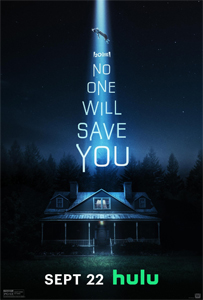Kaitlyn Dever carries the SF-horror film “No One Will Save You” (Hulu), but by the end, it’s not worth the effort. She’s already in the ranks of today’s best 20-something actresses, and this movie won’t change that. But the performance – mostly physical and facial – is in service of writer-director Brian Duffield’s thin and ultimately familiar story.
An unusual lead character
“No One Will Save You” has initial appeal because it focuses on an introverted woman, Dever’s Brynn. She lives in an agoraphobic’s dream house – an isolated woodsy abode a few miles outside of a small town. Her pleasure is the town diorama in her living room that she expands via online purchases.
This type of character isn’t a horror lead too often. So once the home invasion happens, we get minority-representation horror sort of like “Hush,” which is about a deaf person. It also calls to mind last year’s “Where the Crawdads Sing,” also about a sympathetic shunned woman, but that film boasts more story and characterization.
“No One Will Save You” (2023)
Director: Brian Duffield
Writer: Brian Duffield
Stars: Kaitlyn Dever, Elizabeth Kaluev, Zack Duhame
Anyone who enjoys this film will like it for each revelation that alters the focus, so I’ll note here that SPOILERS FOLLOW.
Dever has fewer lines than Boba Fett in “The Empire Strikes Back,” and Duffield proves that dialog isn’t strictly necessary for a modern film to have forward narrative movement. “No One Will Save You” could have been good, as I was up for following Brynn through a scary adventure and learning the secret behind why the townsfolk – especially the parents of Brynn’s deceased best friend – hate her guts.
But Duffield gets enamored by his aliens, who become the co-leads, overshadowing the townspeople and even Brynn as a character (if not Dever as an actress). These are grey aliens in “The X-Files” vein, enhanced by limbs that extend like tree branches. The special effects are of high technical quality, but no modern viewer will find this to be enough to carry a film.
Twists without surprises (Spoilers)
Vibes from “Signs,” “Invasion of the Body Snatchers” and “Dark Skies” seep into events as Brynn goes on the run (or tries to). It’s mildly intriguing, but each redirection of the focus (to call them “twists” is to over-promise) simplifies the events. The aliens’ telekinetic powers and ultimately their sheer numbers give Brynn no chance.

I briefly wondered if the initial alien home-invader was perhaps intending no harm, and this could be an “E.T.” type of story. But nope; he’s clearly a bad guy. We then go through a series of alien-invasion tropes before landing on a conclusion that makes me think of “The Matrix.”
Brynn is in a happy false reality – mentally – and perhaps this is what “Matrix’s” pod people experience while being drained for their battery power. After playing terrified for most of the runtime, Dever puts on a pretty dress and a happy face and dances, and it’s a notable final redirection.
Sequences like this – and an earlier instance of body horror, and Brynn’s flashbacks, and all her terrified chase scenes – give the impressions Duffield is going for, but with an unintended overall flatness. These are things we’ve seen before; things that many SF-horror films have asked us to think about.
Even as I understand that Brynn is how she is because of the tragic mistake that led to her friend’s death, I don’t feel it in terms of shock value or bone-deep trauma.
A double meaning (Spoilers)
In the abstract, I admire that the title has a double meaning. No one will save Brynn from the home invaders, because she’s socially isolated logistically and due to the animosity between her and the townsfolk.
But also, no one will save her from her psychological problems (what the aliens are doing isn’t legitimate; it’s messing with her brain). She would have to take action herself. Continuing a common movie trend even in this era of increased mental-health awareness, Brynn does not seek counseling.
This isn’t necessarily the wrong approach – if “No One Will Save You” were to achieve a psychological fatalism that emphasizes Brynn’s failure in self-care. It never gets there, as the aliens and Brynn’s immediate problems take the spotlight away from her deeper troubles.

